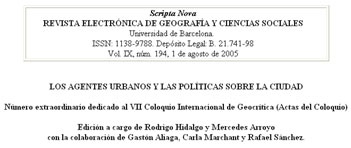The trend to the “esvaziamento” of the central area of the city of Rio De Janeiro and its association with the implementation of telework for the companies
Keywords:
deterritorialization, territory-network, telework, Rio de JaneiroAbstract
It is currently possible to notice the utilization of teleworkers by an increasing number of companies in the city of Rio de Janeiro. This type of work changes the relationship between workers and companies but also workers and city. The main goal of this work is to identify indications of new territorialities in the city related to the use of telework in Rio de Janeiro. The main question that this research tries to answer is: are there new territorialities associated with the emergency of telework in Rio de Janeiro, where agents who produce the urban space are mobilized in the intent to grasp the ongoing transformations? It is a relation of mutual, dynamic, and creative inclusion between the totality and its elements, which happens in a permanent interaction. I understand that dialectic is the way to the maintenance of the unity whole-parts. In other words, totality should be understood as a whole in process of development, where the understanding of the totality does not mean the understanding of the isolated parts. Through the holographic approach, we acknowledge that not only the global scale plays a pivotal role in the local scale but also that the local perception of the global phenomenon influences its local manifestation. This thesis indeed finds new territorialities associated with the use of telework in the city of Rio de Janeiro that cause a series of transformations in the relationship between the teleworker and the city and that contribute to dislocation, disappearence and redistribution of firms and residences within the city. Moreover, such processes are linked to the actions of agents that produce the urban space based on relations constructed in local-local and local-global scale.Downloads
Published
2007-06-07
Issue
Section
Articles
License
Los autores que publican en esta revista están de acuerdo con los siguientes términos:
- Los autores conservan los derechos de autoría y otorgan a la revista el derecho de primera publicación, cin la obra disponible simultáneamente bajo una Licéncia de Atribución Compartir igual de Creative Commons que permite compartir la obra con terceros, siempre que estos reconozcan la autoría y la publicación inicial en esta revista.
- Los autores son libres de realizar acuerdos contractuales adicionales independientes para la distribución no exclusiva de la versió de la obra publicada en la revista (com por ejemplo la publicación en un repositorio institucional o en un libro), siempre que se reconozca la publicación inicial en esta revista.





